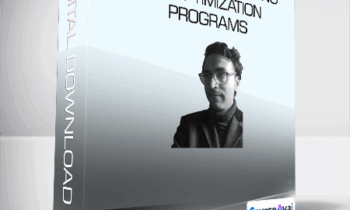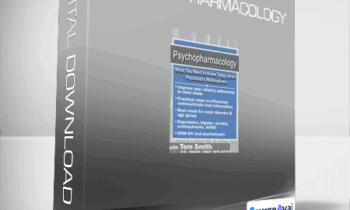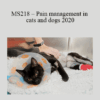Description
Accelerate your learning with the CPD - MS218 – Pain management in cats and dogs 2020 course, priced at just Original price was: $479.00.$114.00Current price is: $114.00. on ESYSGB.com! Explore our extensive catalog of over 60,000 downloadable digital courses across Everything Else. Experience flexible, self-paced learning from experts and save over 80%. Empower your future today!
[Pre-Order] – Deliver digital download link within 4-8 business days after successful payment. Please contact us to get more details.
Purchase CPD – MS218 – Pain management in cats and dogs 2020 courses at here with PRICE $479 $114
MS218 – Pain management in cats and dogs 2020
£347.00 (+VAT)
12 months access to recordings and course materials is included. Please note that these are webinar recordings and not live events. Full details on how to access the Mini Series will be emailed to you.
- Join Dr Jo Murrell BVSc. (hons), PhD, Dipl.ECVAA for three 2-hour online sessions
- The lecture series will cover both acute and chronic pain in both cats and dogs. Evidence to support recommendations with respect to different pain management protocols will be presented where possible. Clinical examples, with the use of video, will also be used throughout the lecture series to show participants what can be achieved with different drug protocols and to illustrate the principles of recognizing and quantifying pain. The first two seminars will focus on acute pain, the last session will focus on chronic pain.
- Comprehensive notes to downloaded
- Self-assessment quizzes to ‘release’ your 8 hours CPD certification (don’t worry, you can take them more than once if you don’t quite hit the mark first time)
- A whole year’s access to recorded sessions for reviewing key points
- Superb value for money – learn without travelling
- Watch the recordings on your iPad!
- This Mini Series was originally broadcast in July 2020
Programme
Pathophysiology of acute pain and underpinning principles of pain management
The first seminar will form the foundation for the second session on acute pain management. It will initially discuss what pain is and what it “means” to animals and how it can be broken down into different sensory, emotional and cognitive component parts. Secondly it will discuss the pathophysiology of acute pain and the underlying neurophysiology of upregulation of pain pathways and how it leads to the development of hyperalgesia, allodynia and spontaneous pain.
The seminar will then progress to discuss the recognition and quantification of acute pain, covering challenges associated with acute pain assessment, including video material of clinical cases. Tools to quantify acute pain in cats and dogs including the Glasgow Composite Pain Scale Feline and Canine, Botacatu Feline Acute Pain Scale and Colorado Acute Pain Scale and their advantages and disadvantages will be described.
The principles and practice of adopting a mechanisms based approach to analgesia, multi-modal analgesia and preventive analgesia strategies will be described, including evidence to support their use.
What you’ll learn:
- What is acute pain and how does it affect cats and dogs
- Pathophysiology of acute pain and mechanisms underpinning hyperalgesia, allodynia and spontaneous pain
- Recognition and quantification of acute pain
- Principles and evidence in support of mechanisms based approach to analgesia, multi-modal analgesia and preventive analgesia
Rationale approach to drug therapy for the management of acute pain in cats and dogs
This seminar will build on the information presented in seminar 1, particularly with respect to the key principles underpinning pain management. The clinical pharmacology of drugs used to manage acute pain will be discussed in detail, initially focussing on opioids and NSAIDs, but including adjunctive agents such as ketamine, alpha 2 agonists, lidocaine and tramadol. Evidence for and against the use of adjuctives will be presented.
This information will subsequently be used to describe rationale intra-and post operative analgesic therapies, using clinical cases to illustrate key principles.
The seminar will finish with practical information about how to implement analgesic techniques in practice. This will include the advantages and disadvantages of using nerve stimulators as well as a description of easily accessible nerve blocks and how they can be used to improve intra and post-operative analgesia.
What you’ll learn:
- Clinical pharmacology of opioids, NSAIDs
- Clinical pharmacology of ketamine, lidocaine, alpha 2 agonists and tramadol
- Building analgesia protocols and tailoring analgesia protocols to meet the demands of the individual patient
- Local anaesthetic techniques: techniques that are accessible in practice (epidural, dental nerve blocks, IVRA)
Chronic pain management in cats and dogs
This seminar will focus entirely on chronic pain management in cats and dogs. It will discuss what chronic pain means to animals and the underlying pathophysiology of chronic pain, including differences between neuropathic and inflammatory pain and examples of clinical conditions that cause these different underlying pain types.
It will then progress to discuss the challenges of assessing chronic pain and veterinary and owner tools that have been developed to quantify chronic pain and quality of life in cats and dogs. How to practically introduce these tools into management of patients with chronic pain will be included.
In the final part of the seminar the principles of managing chronic pain will be described as well as recent evidence on the chronic use of NSAIDs in cats and the clinical pharmacology of analgesics such as paracetamol, grapiprant, gabapentin, amantadine and tramadol and evidence to support their use in chronic pain conditions. There will be a focus on managing pain caused by osteoarthritis, including what to do when NSAIDS are no longer effective and the potential role of neutraceuticals and DMOADs for the management of osteoarthritis related pain.
What you’ll learn:
- What is chronic pain and how does it affect cats and dogs
- Pathophysiology of chronic inflammatory and neuropathic pain
- Recognition and quantifying chronic pain and Quality of Life
- Clinical pharmacology of drugs used in the management of chronic pain (NSAIDs, grapiprant, amantadine, tramadol, gabapentin)
- Focus on management of osteoarthritis pain and what to do when NSAIDs are no longer effective
Purchase CPD – MS218 – Pain management in cats and dogs 2020 courses at here with PRICE $479 $114
Build a robust future with the CPD - MS218 – Pain management in cats and dogs 2020 course at ESYSGB.com! Gain lifetime access to high-impact digital content, meticulously designed to boost your career and personal growth.
- Lifetime Access: Permanent and unlimited access to your purchased courses.
- Exceptional Savings: Enjoy discounts of up to 80% off original prices.
- Secure Payments: Your transactions are fully protected and safe.
- Practical Knowledge: Acquire actionable skills for immediate application.
- Instant Availability: Start learning right after completing your purchase.
- Cross-Device Access: Study seamlessly on any desktop, tablet, or mobile device.
Unlock your potential with ESYSGB.com!






















![[Audio] EP95 Conversation Hour 09 - Salvador Minuchin](https://esysgb.com/wp-content/uploads/2023/04/Audio-Only-EP95-Conversation-Hour-09-Salvador-Minuchin-MD-350x210.png)




















![CPD - MS218 – Pain management in cats and dogs 2020 - eSys[GroupBuy] CPD - MS218 – Pain management in cats and dogs 2020](https://esysgb.com/wp-content/uploads/2023/04/CPD-MS218-–-Pain-management-in-cats-and-dogs-2020.png)


![Jason Capital - Digital Millionaire System - eSys[GroupBuy] Jason Capital - Digital Millionaire System](https://esysgb.com/wp-content/uploads/2023/04/4846_new.png)
![Eric Medemar - Ultimate Wholesaling Package - eSys[GroupBuy] Eric Medemar - Ultimate Wholesaling Package](https://esysgb.com/wp-content/uploads/2023/04/4393_new.png)
![David DeAngelo - Love the Final Chapter - eSys[GroupBuy] David DeAngelo - Love the Final Chapter](https://esysgb.com/wp-content/uploads/2023/04/4134_new.png)
![Jason and Trav - The 2015 Paradise Pack - eSys[GroupBuy] Jason and Trav - The 2015 Paradise Pack](https://esysgb.com/wp-content/uploads/2023/04/4838_new.png)
![Bill Twyford and Dwan Twyford - Short Sales Apprenticeship Program - eSys[GroupBuy] Bill Twyford and Dwan Twyford - Short Sales Apprenticeship Program](https://esysgb.com/wp-content/uploads/2023/04/2007_new.png)
![Mike Dillard - Elevation Income Course - eSys[GroupBuy] Mike Dillard - Elevation Income Course](https://esysgb.com/wp-content/uploads/2023/04/3336_new.png)
